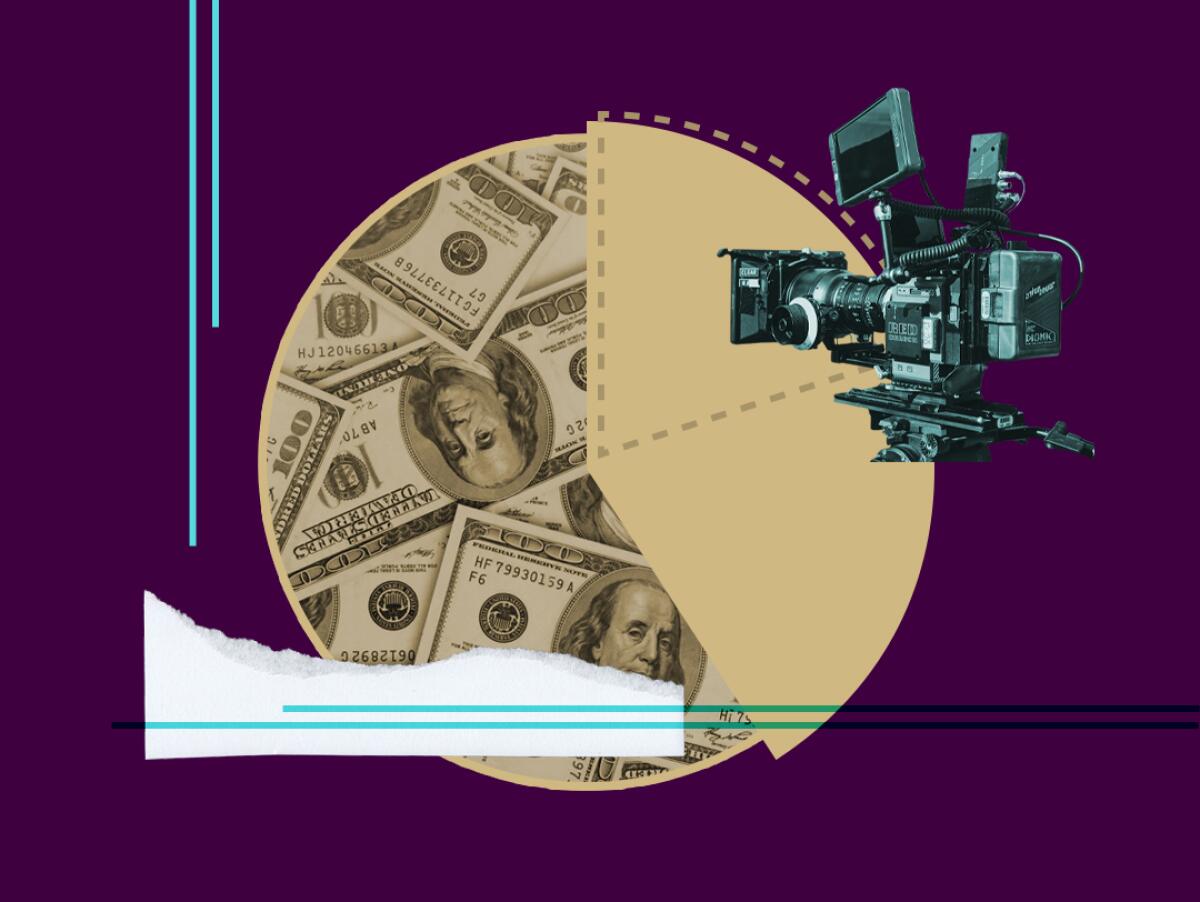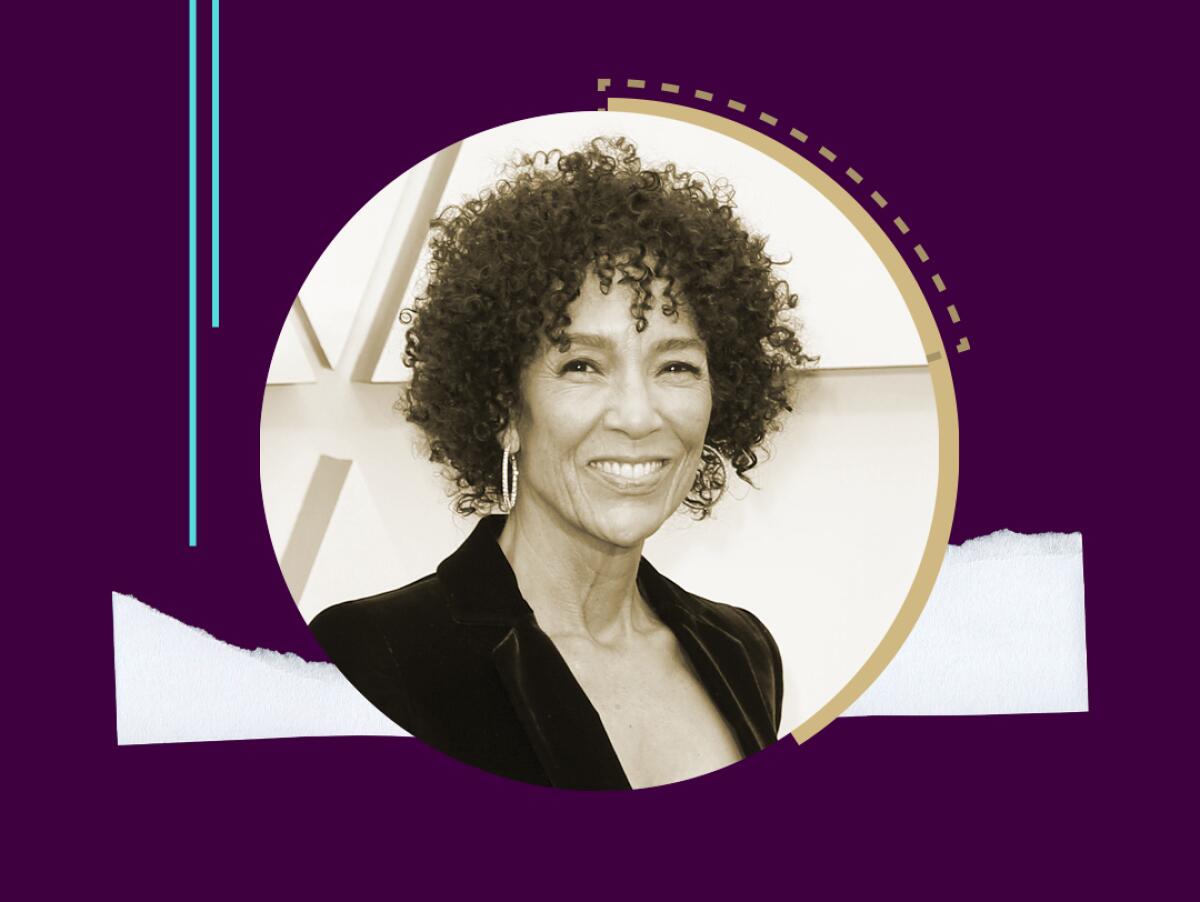A golden age of content? How producers are looking for their share

- Share via
Welcome to the Wide Shot, a newsletter about the business of entertainment. Sign up here to get it in your inbox.
Times film business reporter and Wide Shot founder Ryan Faughnder is on paternity leave; Anousha Sakoui is filling in.
Earlier this summer Jeff Sagansky, veteran media executive and investor, delivered a veritable call to arms to producers and other creatives.
“The producer-studio bond … has been irrevocably broken,” he said at a TV producers convention in Miami, Deadline reported. “We are in a golden age of content production and the dark age of creative profit sharing.”
The June speech hit home for a lot of producers, including the incoming presidents of the Producers Guild of America.
“We feel the wellspring of the moment of producers feeling that we’ve lost this opportunity, and so I think we want to galvanize that feeling and see if we can make some changes,” Stephanie Allain, a former executive at 20th Century Fox and Columbia Pictures, told me in a recent interview.
Last month, Allain became the first Black woman to be president of the PGA, elected along with former Paramount Pictures President Donald De Line at the trade group’s annual membership meeting.
The world of streaming is having what you would call in finance a correction, as my colleague Ryan Faughnder has reported in this newsletter recently.
Some background: As far back as 2019, my other Company Town colleagues Stephen Battaglio and Wendy Lee wrote about the disappearing profit-sharing model as traditional studios like Walt Disney adopted the streamer “cost plus” model.
And for a time, this model, which paid out the cost of the budget plus a fixed premium, has been lucrative for creators, including some producers.
Think of the Ryan Murphy and Shonda Rhimes mega Netflix deals, each reported to be worth hundreds of millions of dollars. Or Netflix spending a staggering $400 million for two sequels to Rian Johnson’s popular whodunit movie “Knives Out.”
But now streaming companies are in belt-tightening mode. Netflix laid off hundreds of workers after the industry leader experienced a slowdown in subscriber growth. Warner Bros. Discovery, and its HBO business, have shelved numerous film and TV shows and also slashed staff at its streaming platform HBO Max to cut costs.
“They have stopped buying our back-ends, particularly for producers,” said Travis Knox, an independent movie producer and associate professor at Chapman University.
In recent years, as streamers like Netflix pared back how much they will spend to buy out the back-end of films or TV shows, another reliable source of income — the box office bonus — has eroded along with theatrical attendance.

“Being the shepherd on projects and then losing out on what used to be the possibility of compensation by not having a back end ... it’s just kind of antithetical to what we do,” Allain said.
Streaming platforms typically don’t share viewing data with producers, making it hard for them to determine how well their movies or TV shows performed.
Unlike their director, writer or actor colleagues, producers don’t have a union that can negotiate how they are compensated or secure healthcare and pension benefits on their behalf.
That could change. A group of producers has taken steps to form a union, which so far has had its constitution ratified by about 100 producers. They are working to establish their Producers Union ultimately as a bargaining group.
“We’re not trying to buy multiple houses,” Effie T. Brown, a supporter of the union effort, told me last year. “I just don’t want to be poor. I want to be able to put gas in my car.”
More than 50% of producers don’t see any back-end compensation, and over two-thirds have been asked to defer fees on more than two projects, according to a study by the nascent union conducted last year of 550 U.S.-based feature film and documentary producers.
Over half of those who answered the survey earned $25,000 or less from producing in 2020, compared with 41% in 2019, and most said producing was not a sustainable career.
“There’s two versions of people who are a little frustrated right now with the situation: One is making a whole lot less than what they used to make, but they’re still making money, and then there are people who continue to be asked to make and produce movies for not even minimum wage,” said Chris Moore, treasurer of the Producers Union and a producer of the hit movies “Good Will Hunting” and “American Pie.” “And so both of those things are bad for producers at the moment.”
Moore is not as optimistic as some that powerful streamers like Apple and Netflix are going to give third parties the necessary internal data to accurately measure profit-sharing deals, when payments are made after distribution and production costs are recovered.
“I think what will start happening is producers will have to start renegotiating deals from a position of leverage,” Moore said. “But unfortunately, the leverage is still really going to be your relationship to talent and your relationship to the intellectual property.”
But Knox believes studios may be more open to sharing back-end profits with producers as they move toward ad-based tiers and minimize their exposure to costly movies that may misfire.
“The problem is the producers will never have the power to demand it on their own,” Knox said. “But directors and actors and showrunners — they will. So once it becomes the norm to them, producers can jump on board as well.”
Stuff we wrote

— Meg James and Wendy Lee go inside the most expensive TV show ever: Six years ago, when TV viewers were captivated with White Walkers, dragons and the fate of Westeros in HBO’s hit show “Game of Thrones,” Amazon founder Jeff Bezos made it clear he wanted a blockbuster franchise for his streaming service. The Times spoke to Amazon Studios chief Jennifer Salke about the big gamble it is making on “The Lord of the Rings: The Rings of Power,” which premiered Thursday on Amazon Prime Video, bringing back to life the Middle-earth of Tolkien’s lore, where dwarves, elves, humans and harfoots dwell.
— After a rash of crime-related incidents hit movie sets, I spoke to veteran location managers about the risks crews face working on location. It was eye-opening to learn about the very real dangers location scouts and crews navigate when filming in areas where they may not always be welcome.
— Call it the politician as IP, Meredith Blake writes in this deep dive into how Hollywood is chasing dignitaries like never before. From the story: “Once upon a time in Hollywood, if you wanted to sign a nine-figure production deal, it helped to produce something first. Now, all you have to do is run a historic presidential campaign or publicly challenge a monarchy that has endured for a thousand years — the latest evolution of the entertainment industry’s long-standing preference for known quantities, from established movie stars to comic-book franchises.”
— Michael Ordoña shares expert tips on how to nail your self-tape audition: Even before the COVID-19 pandemic, in-person auditions were diminishing and self-tapes were on the rise. Since the shutdowns proved how safe and effective those prerecorded versions can be, they’ve become the standard. And casting directors and actors believe the industry won’t be going back.
Number of the week

Amazon’s Culver City studio has spent more than $700 million on the eight-episode first season of “The Rings of Power,” including to buy TV rights, according to people familiar with the budget who were not authorized to comment. Amazon said more than 25 million people tuned in to watch on the first day, setting a record.
Catch-up reading...
Insider’s Kate Taylor investigated the behavior of Nickelodeon hit maker Dan Schneider, who didn’t like having female writers on his Nickelodeon shows and created a hostile work environment for women, she quoted ex-colleagues as saying. A person close to Schneider refuted the allegations, and a former Nickelodeon executive said his conduct was “carefully scrutinized and approved,” according to Insider.
The Daily Beast reported on allegations leveled in a lawsuit accusing comedians Tiffany Haddish and Aries Spears of child sexual abuse of minors involved in comedy routines. Representatives of Haddish and Spears dismissed the allegations and called the lawsuit a “shakedown.”
The Hollywood Reporter’s Scott Feinberg broke the news of turmoil at the Hollywood Critics Assn., which has been rocked by multiple member resignations, including the departure of its president, amid questions over its finances and voting procedures.
Finally ...
The next month is going to be a fascinating one for streaming and football fans. Come Sept. 15, “Thursday Night Football” will be for the first time exclusive to a streaming platform, with Amazon Prime holding those rights. And YouTube is offering free three-week subscriptions to YouTube TV to follow all the football content you want. Not that I’m a football fan ... just a streaming enthusiast.
Inside the business of entertainment
The Wide Shot brings you news, analysis and insights on everything from streaming wars to production — and what it all means for the future.
You may occasionally receive promotional content from the Los Angeles Times.




